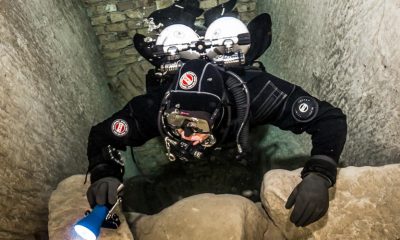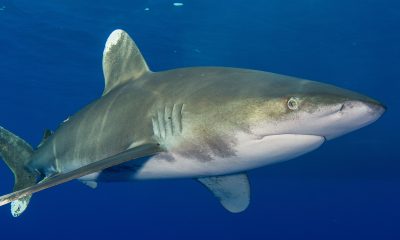Marine Life & Conservation
Climate solutions must include ban on bottom trawling in Marine Protected Areas, says Marine Conservation Society

 A new report from the Marine Conservation Society, Marine unProtected Areas, has found that bottom trawling is taking place in 98% of the UK’s offshore Marine Protected Areas intended to protect vital seabed habitats.
A new report from the Marine Conservation Society, Marine unProtected Areas, has found that bottom trawling is taking place in 98% of the UK’s offshore Marine Protected Areas intended to protect vital seabed habitats.
The yearlong study by experts at the Marine Conservation Society assessed fishing activity in the UK’s offshore Marine Protected Areas. As a result of the report, the Marine Conservation Society is calling for a ban on bottom trawling in these protected areas.
Bottom trawling not only destroys vital underwater habitats but also churns up the seafloor and releases carbon into the ocean and, potentially, the atmosphere. It’s estimated that carbon emissions released by bottom trawling across the UK continental shelf between 2016 and 2040 could cost up to £9 billion to mitigate in other areas of the economy.
Out of all the UK’s Marine Protected Areas, just 5% currently ban bottom trawling. Continuing to allow this fishing method in areas intended to protect the seabed is equivalent to bulldozing a national park on land.
The Marine Conservation Society’s research found that fishing activity inside protected areas continues unabated:
- All but one of the offshore Marine Protected Areas designated to protect the seabed experienced bottom trawling and dredging between 2015 and 2018
- Areas of seabed later designated as MPAs in 2019, experienced the highest rates of fishing between 2015 and 18. There are no fishing restrictions inside these MPAs so nothing is in place to stop this level of fishing from continuing
- Bottom trawl and dredge vessels spent at least 89,894 hours fishing the seabed inside Marine Protected Areas between 2015 and 2018.
Much of the carbon stored in the UK’s seafloor (93%) is found in the muddy and sandy sediments mainly in offshore waters where there are no trawling restrictions. As the seabed is trawled, with fishing gear dragging along the sea floor, carbon stored there is released into the water, where it can make its way into the atmosphere and could ultimately contribute to climate change.
Dr Jean-Luc Solandt, Principal Specialist in Marine Protected Areas at the Marine Conservation Society said: “Our research shows that Marine Protected Areas aren’t protecting our marine habitats. While bottom trawling is still allowed we will continue to release more carbon from the seafloor and prevent complex carbon storing habitats from recovering. In order to battle the climate emergency there has to be limits on where fishing of this kind can take place.
“We’ve been calling for adequate protections for UK seas for more than a decade, to protect and recover our degraded marine life, with very few results. With the introduction of the new Fisheries Act, bottom trawling must be banned in Marine Protected Areas that are designed to protect the seabed. Without a ban on this form of fishing, these areas of our seas simply aren’t recovering and we’re missing a crucial opportunity to combat climate change and ensure there are indeed plenty more fish in the sea.”
A complete ban of bottom trawling in Marine Protected Areas is proven to be effective; within five years of protection from bottom trawling, animals in three UK and Isle of Man Marine Protected Areas were found to be larger and more diverse. When areas of sea around the world were fully protected, biodiversity was found to increase by an average of 21%. Alongside flora and fauna bouncing back, carbon stores are left undisturbed and are able to build back up, as new life emerges on the seabed.
To date, agreeing fisheries management measures for offshore Marine Protected Areas through an EU consultation and evidence gathering process has been complicated by changing dynamics between other EU member states and the UK. Now, with the powers provided by the Fisheries Act 2020, the UK Governments can act more independently to recover our seas and combat climate change.
Read the Marine Conservation Society’s summary report here. For more information on the charity’s Marine Protected Area work, visit the website here.
Header Image: Curled octopus (Eledone cirrhosa) amongst a horse mussel bed (Modiolus modiolus) Shetland, Scotland, UK, August. Photographer: SCOTLAND:The Big Picture
Marine Life & Conservation
Double Bubble for Basking Sharks

 The Shark Trust is excited to announce that, for two more days only, all donations, large or small, will be doubled in the Big Give Green Match Fund!
The Shark Trust is excited to announce that, for two more days only, all donations, large or small, will be doubled in the Big Give Green Match Fund!
Donate to Basking in Nature: Sighting Giants
The Shark Trust is hoping to raise £10k which will be doubled to £20k. This will go towards Basking in Nature: Sighting Giants. And they need YOUR help to reach they’re goal.
The Shark Trust’s citizen science project is to monitor and assess basking sharks through sightings; encouraging data collection, community engagement, and promoting nature accessibility. This initiative aims to enhance health and wellbeing by fostering a deeper connection with British Sharks.
Campaign Aims
- Increase citizen science reporting of Basking Sharks and other shark sightings to help inform shark and ray conservation.
- Provide educational talks about the diverse range of sharks and rays in British waters and accessible identification guides!
- Create engaging and fun information panels on how to ID the amazing sharks and rays we have on our doorstep! These can be used on coastal paths around the Southwest. With activities and information on how you can make a difference for sharks and rays!
- Promote mental wellbeing through increasing time in nature and discovering the wonders beneath the waves!
Donate, and double your impact. Click Here
Marine Life & Conservation
Leading UK-based shark conservation charity, the Shark Trust, is delighted to announce tour operator Diverse Travel as a Corporate Patron

 Corporate Patrons provide a valuable boost to the work of The Shark Trust. The Trust team works globally to safeguard the future of sharks, and their close cousins, the skates and rays, engaging with a global network of scientists, policymakers, conservation professionals, businesses and supporters to further shark conservation.
Corporate Patrons provide a valuable boost to the work of The Shark Trust. The Trust team works globally to safeguard the future of sharks, and their close cousins, the skates and rays, engaging with a global network of scientists, policymakers, conservation professionals, businesses and supporters to further shark conservation.
Specialist tour operator Diverse Travel has operated since 2014 and is committed to offering its guests high quality, sustainable scuba diving holidays worldwide. Working together with the Shark Trust will enable both organisations to widen engagement and encourage divers and snorkellers to actively get involved in shark conservation.
“Sharks are truly at the heart of every diver and at Diverse Travel, we absolutely share that passion. There is nothing like seeing a shark in the wild – it’s a moment that stays with you forever!” says Holly Bredin, Sales & Marketing Manager, Diverse Travel.
“We’re delighted to celebrate our 10th year of business by becoming a Corporate Patron of the Shark Trust. This is an exciting partnership for Diverse and our guests. We will be donating on behalf of every person who books a holiday with us to contribute towards their vital shark conservation initiatives around the world. We will also be working together with the Trust to inspire divers, snorkellers and other travellers to take an active role – at home and abroad – in citizen science projects and other activities.”
Paul Cox, CEO of The Shark Trust, said:
“It’s an exciting partnership and we’re thrilled to be working with Diverse Travel to enable more divers and travellers to get involved with sharks and shark conservation. Sharks face considerable conservation challenges but, through collaboration and collective action, we can secure a brighter future for sharks and their ocean home. This new partnership takes us one more valuable step towards that goal.”
For more information about the Shark Trust visit their website here.
For more about Diverse Travel click here.
-

 News3 months ago
News3 months agoHone your underwater photography skills with Alphamarine Photography at Red Sea Diving Safari in March
-

 News3 months ago
News3 months agoCapturing Critters in Lembeh Underwater Photography Workshop 2024: Event Roundup
-

 Marine Life & Conservation Blogs2 months ago
Marine Life & Conservation Blogs2 months agoCreature Feature: Swell Sharks
-

 Blogs2 months ago
Blogs2 months agoMurex Resorts: Passport to Paradise!
-

 Blogs2 months ago
Blogs2 months agoDiver Discovering Whale Skeletons Beneath Ice Judged World’s Best Underwater Photograph
-

 Gear Reviews3 months ago
Gear Reviews3 months agoGear Review: Oceanic+ Dive Housing for iPhone
-

 Marine Life & Conservation2 months ago
Marine Life & Conservation2 months agoSave the Manatee Club launches brand new webcams at Silver Springs State Park, Florida
-

 News3 months ago
News3 months agoWorld’s Best Underwater Photographers Unveil Breathtaking Images at World Shootout 2023


















